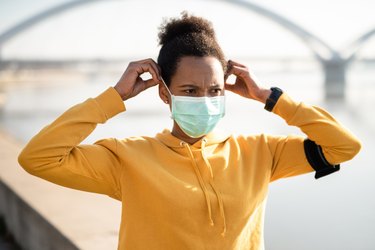
Sneezing, a stuffy nose and itchy eyes are more than enough to manage during allergy season, but the pandemic adds another layer — quite literally — in the form of a mask.
Wearing a mask can actually help protect you on high-pollen days by creating a physical barrier between you and the offending stuff. That's the good news. But there are other factors that might make a mask cumbersome to manage during allergy season, like the fact that you can't easily access your drippy nose.
Video of the Day
Video of the Day
Here, we've tapped a few experts to share their best tips for managing seasonal allergy symptoms when masking up is still the order of the day.
Get tips on how to stay healthy, safe and sane during the novel coronavirus pandemic.
1. Start Early
Don't wait for your allergy symptoms to start before you take action. Plan ahead so you can start the prevention process a few months before your symptoms flare, Denisa Ferastraoaru, MD, an allergist and immunologist at Montefiore Medical Center, tells LIVESTRONG.com.
Pollen usually begins to increase in the air at the end of February, with peaks growing in March and April. So, starting your allergy medications and precautions around this time can help prevent worsening of symptoms, she says.
2. Try Over-the-Counter Remedies
Now is not the time to skimp on taking effective medication for your allergy symptoms, especially because coughing, sneezing and wheezing might raise concern for COVID-19, Sakina Bajowala, MD, an allergist and immunologist at Kaneland Allergy and Asthma Center, tells LIVESTRONG.com.
Nasal sprays work very well, says Dr. Bajowala: "Saline nasal spray twice daily can flush allergens and pollutants out of the nasal passages, keeping the lining of the nose moisturized."
She also recommends making an appointment early on with your physician to talk about any additional medications that might help.
3. Keep Extra Masks on Hand for Back-Up
Raise your hand if you've had to sneeze inside your mask. We're with you. Concerned that it's counterproductive to be sneezing your germs into the tightly-wrapped mask you're wearing?
If you sneeze or have a runny nose that collects moisture in your mask, it might be time to replace your face mask, Dr. Bajowala suggests. But in general, sneezing into your mask or having a moderately runny nose isn't going to affect you health-wise.
Still, the anxiety of sneezing in public can impair quality of life and affect your relationships with other people, she says. That's why she suggests carrying extra masks with you: When you sneeze, take off your mask, throw it away if it's the disposable kind, wash your hands and put on a new, clean mask.
4. Choose the Right Type of Mask
In general, the more layers a mask has, the better it will work, says Dr. Ferastraoaru: "Wearing a double layer of cloth mask is the best in terms of preventing you from giving COVID-19 to other people and also protecting against allergens."
If you have asthma or have trouble breathing at baseline due to allergies and feel your mask is affecting or exacerbating the feeling, test out different types of masks, she suggests. Respirators, such as N95 masks, do a great job at trapping pollen and will also capture mold particles, which are smaller than pollen and can sneak in around the edges of a poorly fitted mask.
The most important thing — for protection against the coronavirus and allergens — is that your mask fits snugly to your face and fully covers your nose and mouth.
5. Wash, Wash, Wash
If you have seasonal allergies, it's helpful to wear a freshly washed cloth mask every day, because allergens like pollen can build up on the fabric. Try switching it out twice a day if your allergies really flare up, says Dr. Ferastraoaru. Just make sure the masks are completely dry before using them again.
If you have sensitive skin or an allergic reaction to a specific detergent, Dr. Ferastraoaru recommends choosing detergents without fragrances or with low amounts of chemicals. Any detergent that's used for small children's clothing or labeled for sensitive skin should work just fine, she says.
6. Allergy-Proof Your Home
Keep in mind that indoor environmental allergens (think: pet dander, dust mites, mold) could trigger your seasonal allergies, Dr. Ferastraoaru says. She recommends putting allergy covers over your furniture and investing in a HEPA air filter, which may help trap some of these particles.
The thought of wearing a mask indoors might not seem appealing, but wearing one while you're cleaning can also help control allergies.
7. Try a Eucalyptus Shower
If you've seen pictures popping up on your social feeds of fresh eucalyptus bouquets hanging from shower heads, it's not just for the spa experience or aesthetic.
This greenery, along with a few menthol oil drops in your shower, might be helpful in making you feel as though you are breathing more freely, says Dr. Bajowala. Just don't use this as a complete remedy, she says, because it doesn't actually reduce congestion.
Read more stories to help you navigate the novel coronavirus pandemic:
Was this article helpful?
150 Characters Max
0/150
Thank you for sharing!
Thank you for your feedback!
Is this an emergency? If you are experiencing serious medical symptoms, please see the National Library of Medicine’s list of signs you need emergency medical attention or call 911.